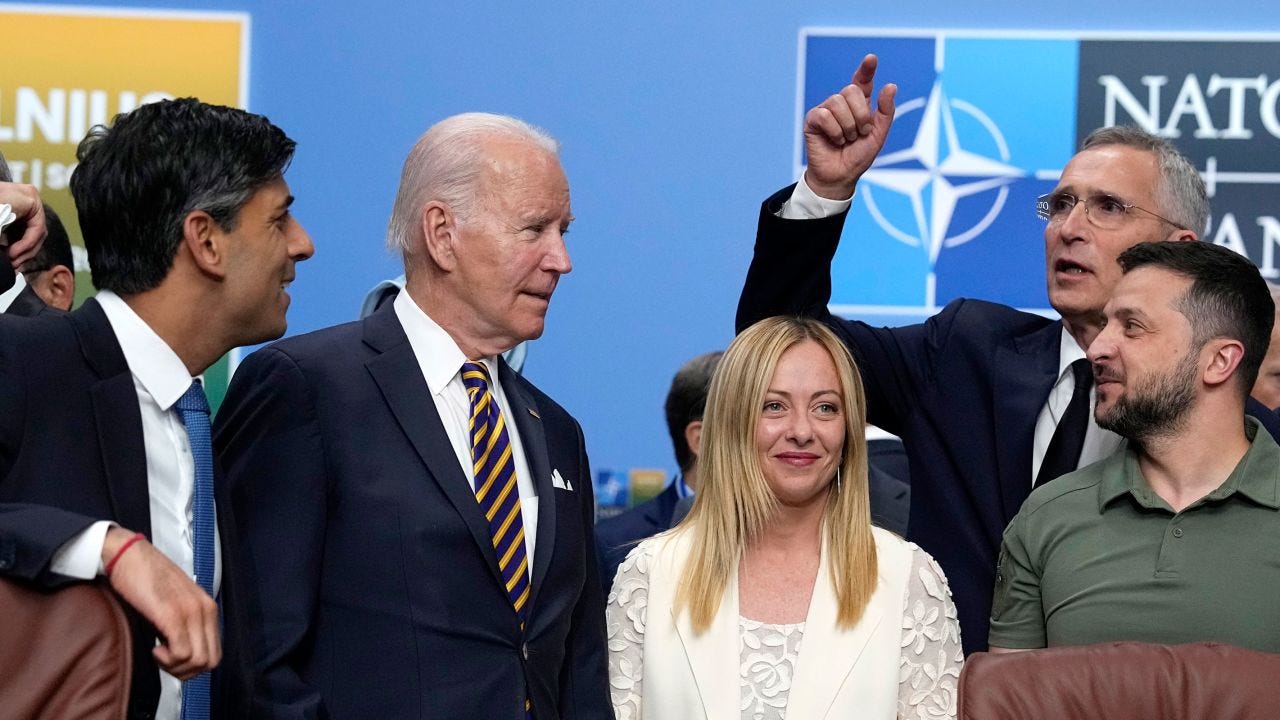Javier Milei irrupts in Argentina's elections BoP Brief #4
Javier Milei in Argentina, Giorgia Meloni's long-game in Washington, and Catalonia holds the keys of the Spanish government
Javier Milei ahead in the race to be Argentina’s next president
Before populist upheavals reached the North Atlantic, they had already dominated Latin American politics for a decade.
They went “quiet” for a while but never went away. Why? Because the problems they wanted to address have never been addressed.
But that doesn’t mean that populist sentiment will return in the same form.
Now a right-wing libertarian anti-establishment candidate Javier Milei came ahead in Argentina’s primary election, using similar slogans that left-wing populists used to fight the austerity programs of the IMF almost twenty years ago.
Milei comes with a program of deregulation and cutting public spending and touches on the typical culture war topics.
But he doesn’t argue from a traditionalist conservative position but appeals to individual freedom and opposing state involvement on these issues.
I think it is important to pay attention to him because he has a shot at winning the the next presidential election.
Melei’s strengths
What attracts people to Melei is that he attacks the political establishment (la casta) of both right and left-wing traditional parties – although the Peronist left is the one that gets more of his attention.
Melei rose in a moment of generalized exhaustion in Argentina’s citizens.
In yesterday’s speech, he said something like:
I called myself liberal* when everyone hated this word. If I had paid attention to focus groups, I’d have called myself socialist, but I preferred to fight it. And that set me apart.
And he was right. That gave him a unique brand in Argentinan politics that made him stand out.
He looks, talks, and feels different from the traditional options.
Most mainstream analysts fail to calibrate anti-establishment forces because they focus too much on their ideological package and eccentric views.
Beyond a couple of key program points that mainstream parties can’t assume, what matters is if they have momentum, energy, and authenticity.
And Javier Milei offers the three of them.
There is no “Populist International.”
What anti-establishment means depends more on the establishment than on the “anti.”
That means what can pass as anti-establishment in Argentina might not be in the US and Europe.
Explanations relying too much on international analogies and ideological proximities will be wrong to calibrate the impact of populist movements most of the time.
International ideological networks can help each other financially, sharing narratives and experiences.
But at least for this kind of populist upheaval, regional and national conditions are the defining factor.
A few weeks ago, I talked about Vox in Spain. Milei has shown sympathies with Vox.
They may share many talking points but do not represent the same outsider's anti-establishment sentiment.
Anti-establishment is not the same as anti-incumbent.
Being against a leftist government to become the junior partner of a right-wing mainstream party doesn’t make you anti-establishment, no matter how radical your rhetoric is.
Nonetheless, Argentina has often been a good thermometer for extreme social changes.
It was in Argentina where the Washington Consensus began to fail in the early 2000s. After decades of state intervention expansion around Latin America and the world, a turn towards a libertarian grassroots feeling might anticipate a generational change of opinion.
However, I think it is still too early to reach any conclusion.
Why do I think Milei has a chance?
Well, because he came ahead of the primary elections? Yes, but not really.
Usually, things can get complicated for a leading anti-establishment contender in this kind of setting because mainstream parties will team together against them.
That’s what most likely will happen forever to Marine Le Pen in France.
In Argentina, however, with a strong division between the traditional left and right, it is difficult for them to reach an agreement to beat Milei.
That gives Milei a chance to repeat his victory in the first round of the elections.
However, the following months can become a war of attrition for his campaign.
Why Milei matters?
Argentina is one of the most important countries in South America, with a strong cultural influence, market, and commodities sector.
Milei’s most relevant measure is to eliminate Argentina’s central bank and adopt the dollar as the national currency, which will have crucial geoeconomic implications.
That would cool down premature talks about de-dollarization and shoot down any prospects of a MERCOSUR common currency.
Also, yes, Milei is against MERCOSUR.
For this and for Milei’s proximity to Bolsonaro, the relations between Milei and President Lula of Brazil will be tense, impacting the region's geopolitics.
That might be good for the US and indirectly reduce China’s influence in the region. However, neither Macri nor Bolsonaro reduced their trade dependence with China.
Bottom line:
As I wrote here, populist insurgents are good at winning elections but bad at governing.
It is evident that Milei can be a force of disruption. But it is still too soon to see if he will be a force for creation.
Argentinian voters might have the same doubts.
Giorgia Meloni’s geoeconomic strategy
Now we move to the country of most of Argetina’s ancestors, Italy.
Giorgia Meloni visited Washington a couple of weeks ago, where she assured Biden she would not be a problem for America in Europe.
Many see Meloni’s attitude towards the US and the EU as a betrayal of her pro-sovereign agenda.
It is true that Giorgia Meloni is not bringing a revolution to Italy.
That has been clear since before she took office. Nonetheless, that doesn’t mean that her program will leave Italy as it is.
Meloni is playing a long-game
Despite its deficient governance structures and high debt, Italy is the second industrial economy in Europe, ahead of France.
Meloni wants to reinforce Italy’s industrial power and intends to use Italy’s state capacity and American capital to help her achieve her goals.
She can’t do that confronting Brussels and Washington.
The Italian economy is not fit for that fight, her grip on the state is far from consolidated, and the structure of her political movement doesn’t give her room to play that hard.
Meloni knows that no matter what, Italy will operate in a context of limited sovereignty, whether by a European framework or a Western bloc.
She also knows that America doesn't need another front in Europe, so keeping a good relationship with the US will help her to manage the potential hostility from France and Germany.
So don't be mistaken; Macron is as much a "vassal" of the Americans as Meloni is, but at least she tries to make the best of it.
Meloni's strategy is not exempt from risks.
Meloni might be doing too little too late for Italy’s economy.
She has a tough coalition to govern, and the looms of a recession in Europe could harm her ambitions.
Why this matters?
I will write more about Meloni and Italy’s geoeconomic playbook in the future.
For now, the relevant point is that given Meloni’s ascendancy among Europe’s right-wing, her success or failure can influence the geopolitical visions of nationalist forces in the EU.
Peripheral nationalist forces have a tough dilemma after the Spanish general elections.
Catalonia, Italy’s most Western region, according to the great writer Josep Pla, holds the keys to deciding the future of the Spanish government again.
I wanted to share with you an article I wrote about the strategies and dilemmas of peripheral nationalist forces after the Spanish general elections – hopefully, the last thing I write about this topic for a while.
Why this matters?
First because in the UK, we could see a similar scenario:
Finally, the current political landscape in Spain carries wider lessons for Europe, perhaps most obviously in the U.K., given the resurgence of nationalist movements in Scotland, Wales and Northern Ireland. In a scenario where the next British prime minister needs the votes of the Scottish National Party or Wales’ Plaid Cymru to govern, those parties could face the same dilemmas as their Iberian counterparts. Meanwhile, the failure of Catalonia’s unilateral independence strategy in 2017 reinforced a moderate approach by the SNPwith regard to its own ambitions for Scottish independence. In the same way, a failure of today’s more transactional approach to deliver results in Spain could strengthen hard-liners in the United Kingdom.
On the other hand, the strategic cul-de-sac in which the PP and Vox have put themselves also serves as an important lesson for a British Conservative Party that is increasingly questioning the U.K.’s devolved powers and tempted by an England-centric nationalism.
Second, as I have said before because what we see in Spain is a reflection of the unstable equilibrium of European politics:
Most importantly, the unstable equilibrium that characterizes Spanish politics is yet another illustration of the increasingly polarized and fragmented political systems on display throughout Europe. Under the surface of the resilience that European liberal democracies demonstrated in the face of the political eruptions in the 2010s, the cracks in their political systems, whether in Spain or elsewhere, remain visible.
Bottom line:
Please do not believe the triumphalist accounts of the triumph of restorationism in Western liberal regimes that we have been reading for the past two years.
This week’s long-read: Baron’s of the Sea
It is summer, and those of you who don't live in America may go on vacation.
If you have time to grab a book, I’d recommend Barons of the Sea by Steven Ujifusa.
I find everything related to maritime history fascinating, but this one is especially good and entertaining. As I shared with the team of the Catalonia Global Institute:
Steven Ujifusa meticulously examines the pivotal role of 19th-century American clipper ships and their captains within the context of maritime commerce and technological innovation. By delving into the intricate web of competitive dynamics and economic implications, the book explores the stories of the dynasties that forged America, like the Forbes and the Delanos, and the fortunes they made in the opium trade with China. Through comprehensive research and eloquent prose, it resurrects forgotten maritime luminaries and elucidates their enduring impact on global trade and transportation evolution. A scholarly tour de force that enriches our understanding of the interplay between commerce, innovation, and historical legacy.
This is all for today; I hope you have a great week ahead,
Miquel



